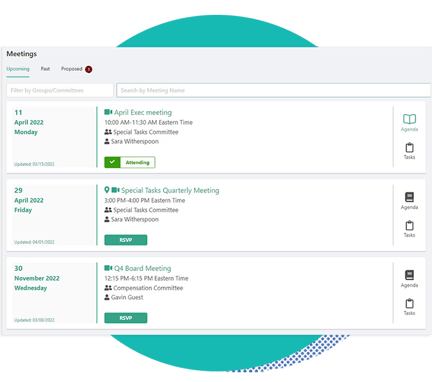This is the first in our series, You Asked, We Answered, where we answer some of the questions we hear at conferences, from clients, on calls—wherever people are talking about good governance.
What does board success look like?
Board success looks different than it did just a few short years ago. In the past, boards were largely focused on shareholder governance, with a narrow view of success that prioritized the stock price.
The scope of successful board performance has been shifting steadily to stakeholder governance. The change was slow at first, but in the past couple of years the momentum has grown swiftly and decidedly. Look no further than Larry Fink and Blackrock, the World Economic Forum, the Business Roundtable, the British Academy’s Principles for Purposeful Business, the SEC, and more. They’ve all unequivocally endorsed the idea of stakeholder governance, ESG, sustainability, and long-term value growth.
 Stakeholder governance, by its very nature, is better for people and for the planet. It charges boards and companies to consider the potential risks that climate change might have on operations, upstream and downstream. That gives investors a better picture of the company’s lifecycle, so they can make more informed decisions. Boards that focus on stakeholder governance also need to understand the effect their business has on their communities and the environment, and they need to work toward making as little of a negative environmental impact as possible. Stakeholder governance means better wages and working conditions, less pollution, greater equality, and many more positive impacts on society. From a strictly business perspective, it also leads to fewer surprises, a better understanding of risk, better communication, and an improved reputation with consumers.
Stakeholder governance, by its very nature, is better for people and for the planet. It charges boards and companies to consider the potential risks that climate change might have on operations, upstream and downstream. That gives investors a better picture of the company’s lifecycle, so they can make more informed decisions. Boards that focus on stakeholder governance also need to understand the effect their business has on their communities and the environment, and they need to work toward making as little of a negative environmental impact as possible. Stakeholder governance means better wages and working conditions, less pollution, greater equality, and many more positive impacts on society. From a strictly business perspective, it also leads to fewer surprises, a better understanding of risk, better communication, and an improved reputation with consumers.
As the global march toward stakeholder governance continues, and companies reject the myopic focus on shareholder interests, the role of the board of directors is evolving, too. Boards are a crucial component in navigating the company’s new priorities. And they have to consider many more factors in their decision-making process.
Stakeholder governance necessitates the board getting a more comprehensive view of how the company operates. There are many more people involved, many more opinions, and a lot more information.
Boards succeed when they’re committed to all their stakeholders, not just their shareholders, making the company stronger and more valuable to investors, and mitigating risk.
What does it take for a board to succeed?
How can boards manage this new direction and their new responsibilities? There are proven best practices for successful boards—some are the same as they’ve always been, some are new. For example, at its heart, a board is tasked with making  decisions that move the business forward. That hasn’t changed. The board needs to gather all the information it can, the directors need to communicate and collaborate effectively, and the company needs to move steadily toward its objectives. It’s the objectives that have changed. Boards used have a singular focus on maximizing shareholder value. Now, they have to consider all their stakeholders—employees, suppliers, shareholders, investors, consumers, and more.
decisions that move the business forward. That hasn’t changed. The board needs to gather all the information it can, the directors need to communicate and collaborate effectively, and the company needs to move steadily toward its objectives. It’s the objectives that have changed. Boards used have a singular focus on maximizing shareholder value. Now, they have to consider all their stakeholders—employees, suppliers, shareholders, investors, consumers, and more.
Board management software is another tool boards use to increase productivity. They’re built with comprehensive features that increase efficiency for board administrators and members.
How does board management software help?
Board management software was not created equal. In the 1990s, when board portal technology began to replace manual board process, shareholder governance was the focus, and the software was designed with that in mind. Board management software supports the traditional frameworks of stakeholder governance. There hasn’t been a change in board portal design in 15 years.
Govenda is different. We’re the first fully cloud-based board management software. We saw that the future of boards and businesses was stakeholder governance, and we built our platform with that in mind. Our software includes all the comprehensive features that boards need, and they’re designed to work the way board members work. For example, since stakeholder governance often involves input and expertise from different people at different time, our unlimited users pricing model means boards can pull people into the process as needed—for as long or as short as needed—without worrying about paying for additional licenses.
What is the Board Success Platform™?
Today, boards need board management software that was built to help companies transition to stakeholder governance and to support them when they’ve made the switch. They need board success software that was designed with the user experience in mind.
 For boards that are transitioning or have already transitioned to stakeholder governance, they need board management software that understands how modern boards work. Modern boards need to focus on all their stakeholders, plus ESG, sustainability, and long-term valuation. They need software that understands successful board management is so much more than four meetings a year. It’s every day.
For boards that are transitioning or have already transitioned to stakeholder governance, they need board management software that understands how modern boards work. Modern boards need to focus on all their stakeholders, plus ESG, sustainability, and long-term valuation. They need software that understands successful board management is so much more than four meetings a year. It’s every day.
Things are moving faster than ever, and boards need a board success platform that was designed to keep up. Directors need further reach into the organization, giving them much more visibility into the company (this is where that unlimited users pricing policy is a real plus).
Can boards really make the world a better place?
Most people understand that corporations are largely responsible for causing the devastating environmental damage that has led to the climate crisis. And most people, while they’re happy to bring reusable bags to the store, recycle what they can, and would consider buying an electric vehicle, they’d really like the companies who caused the problems to help solve them.
Stakeholder governance increases transparency. It holds companies accountable for their impact on the environment. It ensures companies pay workers a living wage and give them safe places to work. It makes our air and water cleaner, and increases equality.
So, yes, by focusing on the best interests of all their stakeholders, not just their shareholders, boards of directors can make the world a better place.
Other posts you might be interested in
View All PostsSubscribe to email updates
Get updates delivered directly to your inbox.
 Board Management Software for Better Governance
Board Management Software for Better Governance Govenda Brochure
Govenda Brochure

